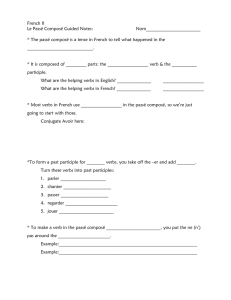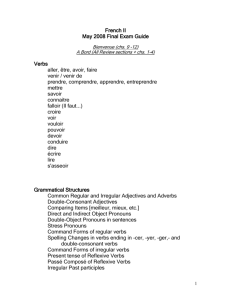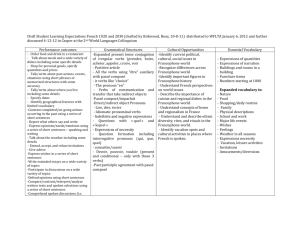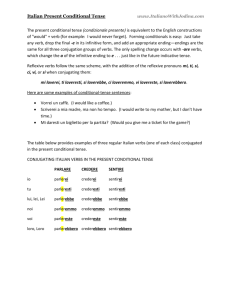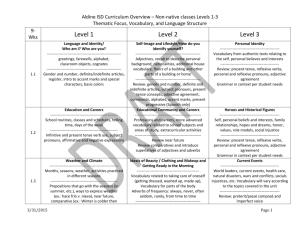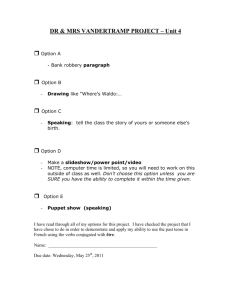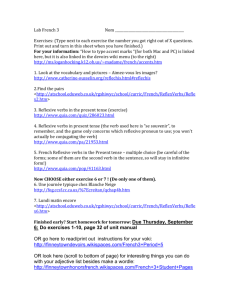Name: K. Drobac Woodland Hills High School Content Area: French
advertisement
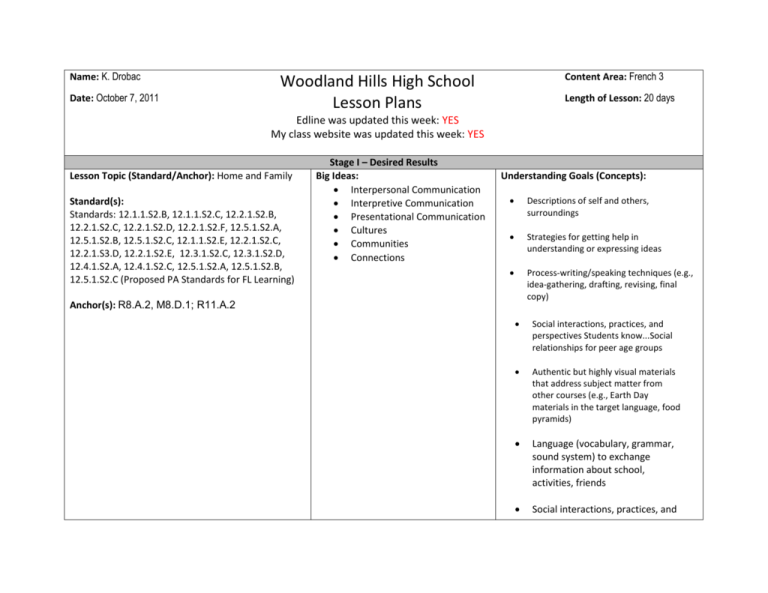
Name: K. Drobac Date: October 7, 2011 Content Area: French 3 Woodland Hills High School Lesson Plans Length of Lesson: 20 days Edline was updated this week: YES My class website was updated this week: YES Lesson Topic (Standard/Anchor): Home and Family Standard(s): Standards: 12.1.1.S2.B, 12.1.1.S2.C, 12.2.1.S2.B, 12.2.1.S2.C, 12.2.1.S2.D, 12.2.1.S2.F, 12.5.1.S2.A, 12.5.1.S2.B, 12.5.1.S2.C, 12.1.1.S2.E, 12.2.1.S2.C, 12.2.1.S3.D, 12.2.1.S2.E, 12.3.1.S2.C, 12.3.1.S2.D, 12.4.1.S2.A, 12.4.1.S2.C, 12.5.1.S2.A, 12.5.1.S2.B, 12.5.1.S2.C (Proposed PA Standards for FL Learning) Stage I – Desired Results Big Ideas: Interpersonal Communication Interpretive Communication Presentational Communication Cultures Communities Connections Understanding Goals (Concepts): Descriptions of self and others, surroundings Strategies for getting help in understanding or expressing ideas Process-writing/speaking techniques (e.g., idea-gathering, drafting, revising, final copy) Anchor(s): R8.A.2, M8.D.1; R11.A.2 Social interactions, practices, and perspectives Students know...Social relationships for peer age groups Authentic but highly visual materials that address subject matter from other courses (e.g., Earth Day materials in the target language, food pyramids) Language (vocabulary, grammar, sound system) to exchange information about school, activities, friends Social interactions, practices, and perspectives Students know… How to scan authentic materials (newspapers, articles, websites, magazines, TV) for practices and perspectives of the culture Student Objectives (Competencies/Outcomes): Students will be able to: Describe the connections that exist between the French and English languages Obtain information and participate in age appropriate cultural experiences/simulations Ask and answer questions about their daily lives Enhance reading / listening skills in first and second languages by working with strategies such as drawing upon prior knowledge, guessing from context, expanding vocabulary Describe cultural practices, products, perspectives in the target culture and their own to find Essential Questions: Where in the local or world community can we use the second language we are learning? How can we continue to study and enjoy a second language after leaving school? How does second language study help us in other areas of the curriculum? What knowledge and insight can we gain from world language study that otherwise would not be available to us? How can learning about the practices of another culture give Expanded vocabulary and basic grammatical structures to compare with how they are similar or different from English Cultural topics that deal with society, community norms to compare with one’s own Vocabulary: Assorted vocabulary pertaining to various aspects of the French family life and furniture and appliances Assorted verbs denoting activities one engages in while with one’s family, as well as other verbs related to those which fit in the category above (s’asseoir and other reflexive verbs in the passé composé) The reciprocal construction in the present and passé composé Assorted negative expressions with the present and passé composé similarities and differences (ex. Celebrations, religion, art, literature, music, dance, work and leisure philosophy, social and political issues, food traditions) Describe people, things & actions (past and present) relating to home and family life in France and the U.S. Compare home life in France with that in the U.S. Tell what people do for each other Identify & describe household appliances, gadgets & furnishings Identify rooms of a house Describe home-oriented activities in the present Describe home-oriented activities in the past Describe reciprocal activities in the present tense (=what people do for each other) Describe their daily routines in the past and present Tell what people do and don’t do/did and didn’t do us insights into the perspectives of the people of that culture? What can the products (art, literature, realia) of another culture reveal about the perspectives of the people of that culture? How can we use the second language we know to exchange information from another person? What can we do to deal with unexpected situations in another culture? How does appreciation of cultural diversity enhance cross-cultural understanding? Stage II – Assessment Evidence Performance Task(s): Response to questions (verbally and on Formative Assessment(s): Graphic organizers, thumbs-up, exit whiteboard); Family dialogue; The Row Game; Chapter 2 Options tickets, open-ended questions, think-pair-share, response Board Project; Conversation in the target language; cards, summarizing main ideas, brief in-class writing prompt, pre-assessment, portfolios, warm-ups Stage III – Learning Plan Materials & Resources: LCD projector; computer with internet access; DVD player; activity response sheets; textbooks; Larousse French-English, English-French dictionaries; writing utensils; notebooks; coloring implements and drawing paper Scaffolding: Graphic organizers, guided notes, build vocabulary, build on prior knowledge, chunking, provide visual support, teacher prompting, KWL, highlighting, grouping students by interest, provide feedback throughout the process, make connections to prior knowledge whenever possible. Active Engagements: Note-taking, graphic organizers, summarizing, higher-level thinking skills, cooperative education, partnering, whole-class response, think-pair-share, compare-contrast, random reporter, conversation in the target language Content Area Reading: French Culture-The Family, Furniture, Pets, Leisure, Appliances Instructional Procedures*: (Include Mini-Lessons) Monday 10/10/11 Tuesday Day Procedures In-Service-No School for Students 10/11/11 Wednesday Day 4 Administer and review warm-up activity. Review reflexive verbs in the present tense Review the formation of the passé compose with être Present students with examples of the reflexive construction in the past tense Direct them to analyze the examples & formulate the rule Direct students to complete a series of activities using these verbs in the present tense. (Do the first 10/12/11 Day 5 Administer and review warm-up activity. Review reflexive verbs in the present and past tenses. Present students with examples of the reciprocal construction in the present and past tenses tense (tell them some things family members do/did for each other). Direct them to analyze the examples & formulate the rule Direct students to complete a series of activities using these Thursday 10/13/11 Day 6 Administer and review warm-up activity. Review the reciprocal construction Direct students to conduct a survey to find out what students do for themselves and what they have others do for them. (Do the first item for the class, and the second one with their help. Then direct students to complete the rest on their own.) Direct students to complete an exit card Friday 10/14/11 Day 1 Administer and review warm-up activity. Conduct a class discussion of one or more articles on an aspect of Francophone culture selected by the class. Assignments item for the class, and the second one with their help. Then direct students to complete the rest on their own.) Direct students to complete an exit card. Find and select an article pertaining to Francophone culture for class discussion on Friday. (Assigned last Friday) Finish the activity started in class. verbs in both tenses. (Do the first item for the class, and the second one with their help. Then direct students to complete the rest on their own.) Direct students to complete an exit card. Finish the activity started in class. Finish the activity started in class. (Summarize the results of the survey.) Read one or two of the articles contributed by students. * Include Active Engagement, Explicit Instruction, Meta-cognition, Modeling, & Scaffolding Find and select an article pertaining to Francophone culture for class discussion on Friday.



